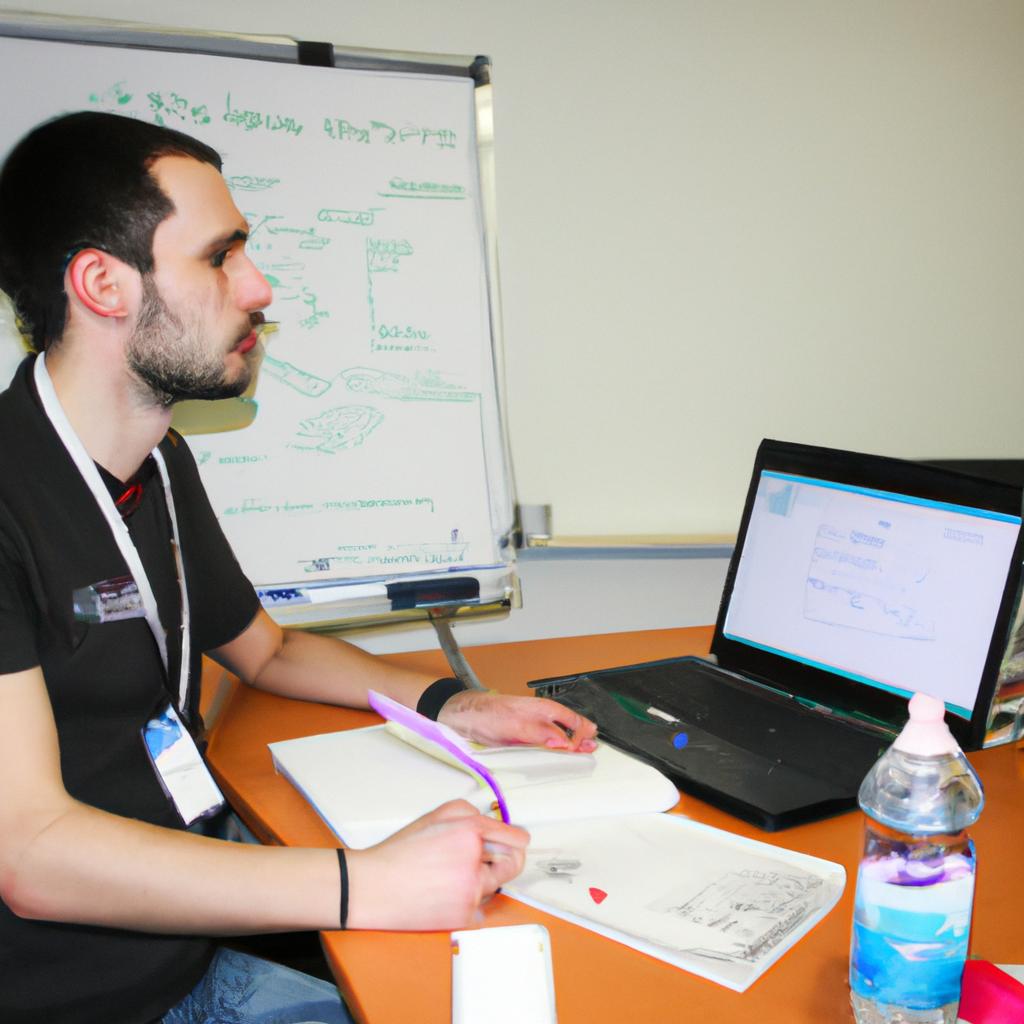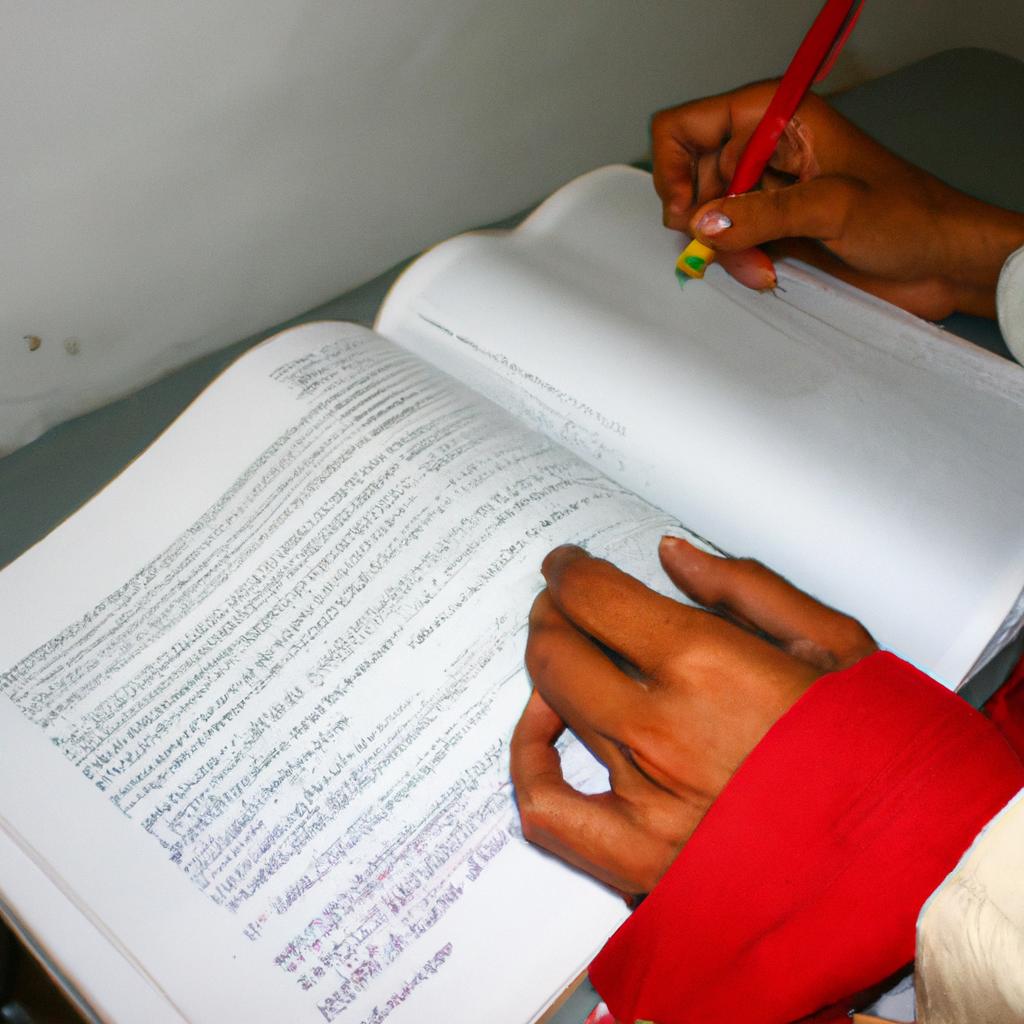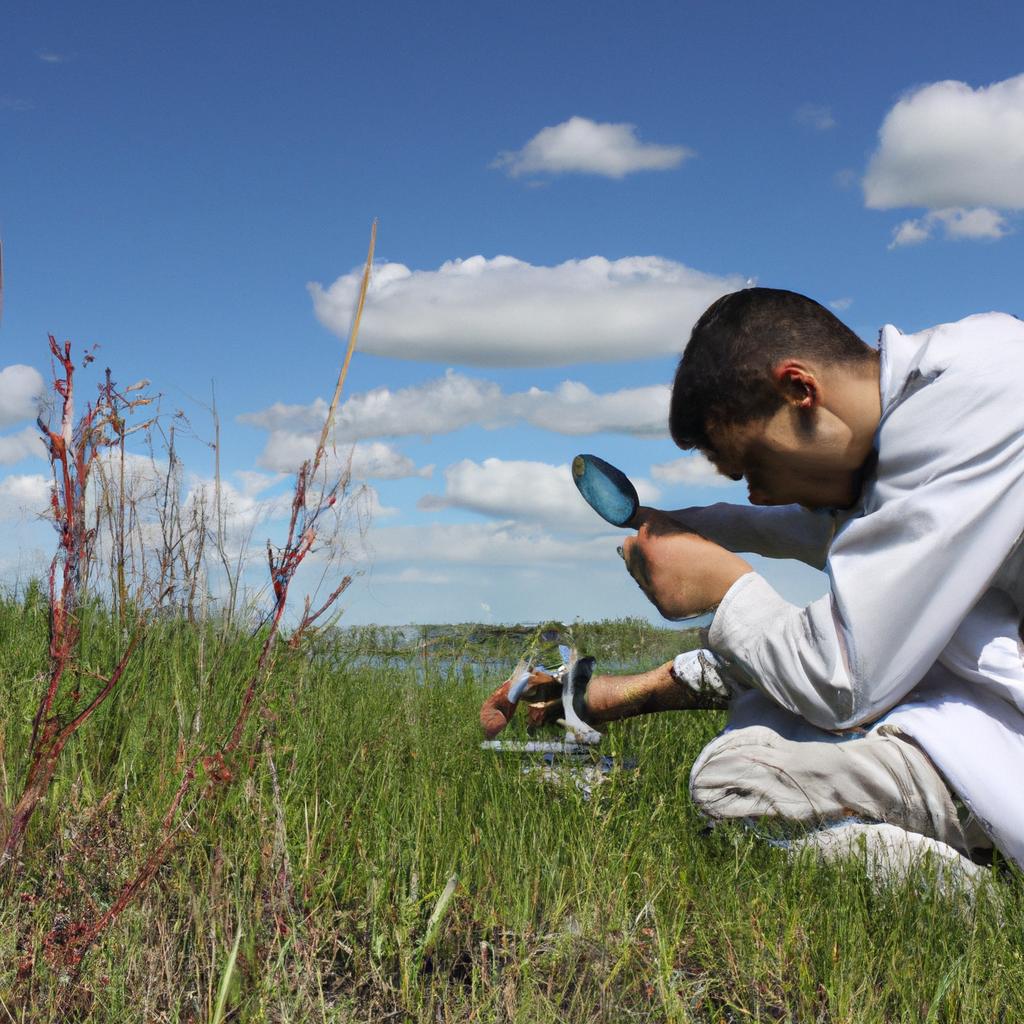In the field of science, gender roles have long been a topic of discussion and exploration. Sociologists have sought to understand how societal expectations and norms shape the experiences and opportunities available to individuals based on their gender within scientific communities. This article aims to delve into the complexities surrounding …
Read More »International Relations in Science: The Dynamics within Political Science
International relations in science is a field that explores the complex dynamics within political science. This article aims to examine the ways in which scientific research and international politics intersect, shaping both national policies and global governance structures. The analysis will delve into how different actors, such as governments, multinational …
Read More »Public Administration in the Context of Science: A Review in Social Sciences: Political Science
Public administration plays a crucial role in shaping and implementing policies that have far-reaching impacts on society. Its significance is particularly pronounced when viewed through the lens of science, as it involves the management and coordination of public resources to achieve scientific objectives. For instance, consider a hypothetical scenario where …
Read More »Developmental Psychology: Human Growth and Development
Developmental psychology is a fascinating field that seeks to understand the intricate processes of human growth and development from infancy to adulthood. By studying various aspects such as physical, cognitive, social, and emotional development, researchers aim to uncover the underlying mechanisms that shape an individual’s journey through life. For instance, …
Read More »Microeconomics in Science: An Informative Perspective
Microeconomics in science is a field that examines the economic decisions and behaviors of individual agents within scientific research. By applying microeconomic principles, researchers can gain valuable insights into how these decisions affect the allocation of resources, production processes, and overall efficiency in scientific endeavors. For example, consider a hypothetical …
Read More »Sociology in Science: The Social Dynamics of the Social Sciences
The field of sociology plays a crucial role in understanding the social dynamics within scientific communities. By examining the intricate relationships and interactions among scientists, policymakers, and other stakeholders, sociologists shed light on how these social factors shape the production of knowledge and influence scientific outcomes. For instance, consider the …
Read More »Community Development Finance: Social Finance in Science Social Sciences
Community development finance is a critical aspect of social finance, particularly in the field of science social sciences. This article aims to explore and analyze the role of community development finance in promoting social well-being and sustainable development within scientific communities. By examining real-life case studies and hypothetical scenarios, this …
Read More »The Role of Socially Responsible Investing in Science: Social Finance in Social Sciences
The growing interest in socially responsible investing (SRI) has brought attention to its potential role in advancing scientific research, particularly within the social sciences. This article explores the intersection of social finance and social sciences, examining how SRI can contribute to funding research that addresses pressing societal challenges. To illustrate …
Read More »Social Impact Investing in Science: The Role of Social Finance in Social Sciences
Social impact investing, a relatively new approach to finance, has gained significant attention in recent years. This innovative investment strategy aims to generate measurable social and environmental impacts alongside financial returns. By directing capital towards organizations and projects that tackle pressing societal challenges, social impact investing seeks to address the …
Read More »Social Psychology: The Dynamics of Human Behavior in Science
Social psychology is a field of study that explores the intricate dynamics of human behavior in scientific terms. It delves into the factors that shape individuals’ thoughts, feelings, and actions within social contexts. By examining how people perceive themselves, interact with others, and respond to societal influences, social psychologists seek …
Read More »Cross-Cultural Communication in Science: Bridging Anthropology and Social Sciences
Cross-cultural communication plays a crucial role in the field of science, particularly when it comes to bridging anthropology and social sciences. This interdisciplinary approach seeks to understand how different cultures perceive and interpret scientific knowledge, ultimately aiming to improve collaboration and exchange within the scientific community. For instance, imagine a …
Read More »Cognitive Psychology: The Mind in Science Social Sciences
Cognitive psychology, a branch of psychology that focuses on the study of mental processes such as perception, attention, memory, and problem-solving, plays a crucial role in understanding human behavior. Through rigorous scientific methods and principles derived from cognitive science, researchers aim to unravel the intricate workings of the mind. For …
Read More »Biological Anthropology in Science: Anthropology in the Context of Social Sciences
Biological anthropology, as a field of study within the broader discipline of anthropology, seeks to understand human evolution and biological variation through interdisciplinary approaches. This article explores the role of biological anthropology in relation to other branches of social sciences, shedding light on how it contributes to our understanding of …
Read More »Economics and Science: The Interdisciplinary Insights in Social Sciences.
In the realm of social sciences, economics and science have long been considered distinct disciplines. However, recent years have witnessed a growing recognition of the interconnectedness between these two fields, leading to a burgeoning interest in exploring their interdisciplinary insights. This article aims to delve into the intricate relationship between …
Read More »Psychology in the Context of Science: The Social Sciences Perspective
Psychology, as a discipline, has always been intertwined with the scientific method and empirical research. From its earliest origins in the late 19th century to contemporary times, psychologists have sought to understand human behavior through systematic observation, experimentation, and statistical analysis. However, psychology is not merely confined within the realm …
Read More »International Economics: Insights from Science in the Social Sciences
The field of international economics explores the intricate interactions between nations in terms of trade, investment flows, and economic policies. It provides valuable insights into how countries collaborate or compete on a global scale, impacting their domestic economies and shaping the world economy as a whole. By applying scientific methodologies …
Read More »Behavioral Economics: Human Behavior in Economics
Behavioral economics is a branch of economics that aims to understand and explain human behavior in economic decision-making. By incorporating insights from psychology, sociology, and neuroscience, behavioral economists seek to shed light on the factors that influence individuals’ choices and actions within an economic context. One example illustrating this field’s …
Read More »Political Economy in Science: The Social Sciences and Political Science
The intersection of political economy and the social sciences has long been a subject of scholarly inquiry, as it seeks to understand the relationship between economic systems and political structures. This field of study examines how economic factors influence politics, and vice versa, shedding light on key dynamics that shape …
Read More »Political Science: The Dynamics of Social Sciences
Political science is a multidisciplinary field that seeks to understand the dynamics of power, governance, and decision-making within societies. It examines the intricate interplay between individuals, institutions, and ideologies in shaping political processes and outcomes. To illustrate this complexity, consider the hypothetical scenario of a country grappling with an economic …
Read More »Ethical Banking in Social Sciences: Social Finance
Ethical banking in social sciences, specifically within the realm of social finance, has gained significant attention in recent years. Financial institutions and investors are increasingly recognizing the importance of aligning their investments with ethical values and societal impact. This article aims to delve into the concept of ethical banking and …
Read More »Cultural Relativism in Science: Anthropological Perspectives
Cultural relativism, a concept deeply rooted in anthropology, has found its way into the realm of science. This perspective challenges the notion that scientific knowledge is universal and objective by asserting that it is instead shaped by cultural beliefs and values. For instance, consider a study on gender roles conducted …
Read More »Development Economics: The Intersection with Science in the Social Sciences
Development economics is a field that examines the economic aspects of development and seeks to understand how countries can achieve sustainable economic growth, reduce poverty, and improve living standards for their citizens. It explores various theories and empirical evidence to analyze the factors influencing development outcomes in different contexts. In …
Read More »Anthropology: Human Societies and Culture through the Science of Social Sciences
In the vast tapestry of human existence, anthropology serves as a critical lens through which we can unravel the intricacies and complexities that define our societies and cultures. By employing the scientific methodologies of social sciences, anthropologists strive to understand the diverse range of human experiences across time and space. …
Read More »Game Theory in Economics: An Informative Analysis in the Context of Science and Social Sciences
Game theory is a powerful analytical tool that has gained significant recognition in the field of economics. It provides a systematic framework for understanding strategic decision-making and predicting outcomes in situations where individuals or organizations interact with each other. By studying the behavior of rational agents and their strategic choices, …
Read More »Comparative Politics in Science: The Social Sciences
Comparative politics, as a subfield of political science, aims to understand and analyze the similarities and differences in political systems across various countries. It provides valuable insights into the functioning of governments and their impact on societies. In recent years, there has been an increasing interest in applying comparative politics …
Read More »Linguistic Anthropology: Language in Anthropological Exploration
Linguistic anthropology, as a subfield of anthropology, focuses on the study of language in anthropological exploration. It examines how language shapes and is shaped by cultural practices, social interactions, and power dynamics within societies. Through linguistic analysis, linguistic anthropologists aim to understand the intricate relationship between language and culture, shedding …
Read More »Family Dynamics: Family Structure and Interactions in Sociology and Social Sciences
Family dynamics play a significant role in understanding the social relationships and interactions within a family structure. The study of family dynamics falls under the purview of sociology and other social sciences, as it explores how families are structured and how individuals within them interact with one another. For instance, …
Read More »Psychological Theories: The Science of Social Sciences
Psychological theories form the foundation of understanding human behavior and have long been a subject of study in the social sciences. By exploring the intricate workings of the mind, these theories provide valuable insights into how individuals perceive, think, and interact with their environment. One such example can be seen …
Read More »Education Systems in the Context of Science: A Sociological Perspective
Education systems play a crucial role in shaping societies and preparing individuals for their future roles. When examining the education system through a sociological lens, it becomes evident that various factors influence its functioning and outcomes. This article aims to explore the intricate relationship between education systems and science from …
Read More »Fair Trade in Science: Social Finance Strategies
The concept of fair trade, commonly associated with the economic realm, has gained attention and relevance in various fields. In recent years, it has also emerged as a significant consideration within the scientific community. Fair trade in science refers to the ethical principles and practices employed to ensure equitable distribution …
Read More »The Power of Behavior: Behavioral Psychology in Science and Social Sciences
Behavioral psychology is a powerful framework that has been widely applied in both scientific and social sciences to understand human actions. By examining the relationship between behavior, stimuli, and consequences, behavioral psychologists strive to uncover the underlying mechanisms driving our actions. This article aims to explore the significance of behavioral …
Read More »History in the Context of Political Science: The Intersection of Science and Social Sciences
History and political science are two disciplines that often intersect, providing valuable insights into the complexities of societies and governments. This article explores the relationship between history and political science, focusing on how this intersection contributes to a deeper understanding of various social phenomena. By examining historical events through the …
Read More »Political Theory: The Intersection of Science and Social Sciences
In the realm of political theory, the intersection between science and social sciences has been a topic of significant academic inquiry. This article aims to explore the dynamic relationship between these two domains and shed light on how scientific methodologies can enrich our understanding of political phenomena. By examining a …
Read More »Abnormal Psychology: A Science of the Mind
Abnormal Psychology: A Science of the Mind Imagine a young woman named Sarah, who has been experiencing intense and persistent feelings of sadness for several months. These emotions have started to interfere with her daily functioning, affecting her ability to concentrate at work and enjoy activities she once found pleasurable. …
Read More »Archaeological Methods in Science: The Techniques in Anthropology
Archaeological methods are crucial in the realm of scientific research, particularly within the field of anthropology. These techniques serve as a means to investigate and uncover valuable insights into past civilizations, shedding light on their cultural practices, social structures, and technological advancements. By employing systematic approaches for excavation, analysis, and …
Read More »Cultural Norms in Science: Sociological Perspectives
Cultural norms in science play a crucial role in shaping the behavior and practices of scientists within their respective communities. These norms encompass shared beliefs, values, and expectations that guide scientific inquiry and interaction among scientists. Understanding cultural norms in science is essential for comprehending how scientific knowledge is produced, …
Read More »Macroeconomics: Key Concepts and Applications
Macroeconomics, as a branch of economics, encompasses the study of aggregate economic phenomena at a national or global level. It seeks to understand and analyze factors that influence a country’s overall economic performance, including but not limited to GDP growth, inflation rates, unemployment levels, and fiscal policies. By examining these …
Read More »Crime and Deviance in Science: An Overview in Sociology
Crime and deviance in science have long been a topic of interest within the field of sociology. This article aims to provide an overview of this intriguing area, shedding light on the various forms that crime and deviant behavior can take within scientific communities. By examining real-life case studies and …
Read More »Ethnography in Science: The Context of Anthropology in Social Sciences
Ethnography, as a research method rooted in anthropology, has found significant application within the field of social sciences. This article aims to explore the context of ethnography in scientific inquiry and its relationship with anthropology. Through an examination of various case studies and theoretical frameworks, it seeks to highlight the …
Read More »Microfinance in Science Social Sciences: The World of Social Finance
Microfinance has emerged as a powerful tool in the field of social sciences, revolutionizing the way financial services are provided to individuals and communities who lack access to traditional banking systems. This article delves into the world of microfinance within the realm of science social sciences, exploring its impact on …
Read More »Social Finance in the Context of Science: Its Role in the Social Sciences
Social finance, in the context of science, plays a significant role in advancing research and understanding within the social sciences. By integrating financial concepts and strategies into scientific methodologies, social finance enables researchers to explore complex societal issues, such as poverty alleviation, climate change mitigation, and sustainable development. For instance, …
Read More »Social Inequality in Science: The Sociological Context
Social inequality is a pervasive issue that permeates various aspects of society, including the field of science. The sociological context provides valuable insights into understanding social inequalities present in scientific practices and institutions. This article aims to explore the complex relationship between social inequality and science by examining how societal …
Read More » Wankanyakla Self Help Group
Wankanyakla Self Help Group









































